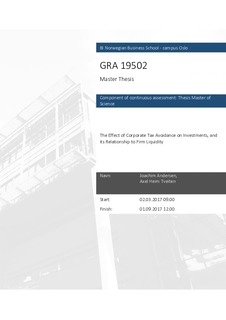The effect of corporate tax avoidance on investments, and its relationship to firm liquidity
Master thesis
Permanent lenke
http://hdl.handle.net/11250/2483984Utgivelsesdato
2017Metadata
Vis full innførselSamlinger
- Master of Science [1621]
Sammendrag
Despite decades of tax and investment research, little is known about the
relationship between a firm's ability to avoid income taxes and its level of
investments. For instance, several researchers conclude that firms’ investment
decisions are sensitive to cash flow variations. However, there is to our
knowledge conducted little or no research on the relationship between liquidity
and investment-sensitivity in relation to tax avoidance. The purpose of this study
is to shed some initial evidence on these questions, and provide new valuable
insight to both future and previous research on a frequently discussed topic.
Using firm-level panel data, we find both statistically and economically
significant evidence of that investments is positively related to the cash flow
effect of tax avoidance. We also find that higher liquidity firms tend to invest
more and companies classified as “good liquidity firms” seem to have a greater
investment sensitivity towards changes in the effective tax rate.
We strive to impose minimal requirements on our sample to maximize our
coverage. Hence, our sample includes both listed and unlisted Norwegian
companies for the 2006-2015 fiscal years. With respect to available data on each
company's cash flow statement, including unlisted companies has its
shortcomings. Since our dataset does not have a direct measure of investment or
capital expenditures, we define three alternative Investment measures to ensure
the robustness of our results. Further, tax avoidance is measured as the level of
effective tax rates relative to pretax income. As in Dyreng et al. 2008, we define
tax avoidance broadly to encompass anything that reduces the firm’s taxes relative
to its pretax accounting income.
All our results are thoroughly tested to ensure the robustness of our findings.
Beskrivelse
Masteroppgave(MSc) in Master of Science in Business, Business law, tax and accounting - Handelshøyskolen BI, 2017
